The Varieties of Religious Experience
4.5
Reviews from our users

You Can Ask your questions from this book's AI after Login
Each download or ask from book AI costs 2 points. To earn more free points, please visit the Points Guide Page and complete some valuable actions.Introduction to 'The Varieties of Religious Experience'
William James's "The Varieties of Religious Experience" is a seminal work that has profoundly influenced the study of religion and psychology. Originally delivered as a series of lectures at the University of Edinburgh in 1901 and 1902, this collection delves into the personal and subjective aspects of religion, exploring its impact on individuals' lives. James's analysis provides a comprehensive examination of religious beliefs, emotions, and instincts through the lens of psychology and philosophy.
Detailed Summary of the Book
James approaches the subject of religion not as a theologian, but as a psychologist and philosopher. "The Varieties of Religious Experience" is composed of twenty lectures, each focusing on different aspects of religious life as experienced by individuals. James emphasizes the importance of understanding religion from a personal and individual perspective, in contrast to institutional or dogmatic views.
Throughout the book, he categorizes various religious experiences, such as mysticism, conversion, and saintliness, and examines their psychological underpinnings. James is particularly interested in the practical effects of religious belief on individuals, including the transformation of personality and the acquisition of a sense of peace or purpose. His work is enriched with a variety of case studies and first-person accounts, providing a humanistic insight into the internal workings of religious psychology.
Key Takeaways
- Religion is best understood through individual experiences rather than institutional doctrines.
- Religious experiences have real and significant psychological impacts on believers.
- Mystical experiences and conversions are common across various religions and cultural backgrounds.
- The value of religious experiences can be evaluated based on their moral and practical outcomes.
- James introduces the concept of the "sick soul" versus the "healthy-minded," providing a spectrum of religious attitudes.
Famous Quotes from the Book
"The greatest discovery of any generation is that a human can alter his life by altering his attitude."
"We and God have business with each other; and in opening ourselves to his influence, our deepest destiny is fulfilled."
"The true meaning of religion is thus not simply morality, nor yet a mode of worship, but a being in right relations to the divine government of the world, and the having certain experiences that flow from this relation."
Why This Book Matters
"The Varieties of Religious Experience" is a pioneering work that opens a window into the psychology of religion. It provides a scholarly yet deeply humanistic perspective, examining how religious experiences shape not only individual lives but also societies. William James’s methodical yet accessible approach has allowed this work to resonate with a broad audience, including academics, clergy, and lay readers alike.
Its focus on a variety of religious experiences across cultures and traditions breaks down barriers, promoting greater understanding and dialogue between different faiths. Furthermore, the book has influenced many fields, including psychology, philosophy, theology, and even literature, serving as a foundational text for understanding the power of belief and its manifestations in human life.
The relevance of James's insights into the personal nature of religious experience endures today, offering a timeless exploration of spirituality that transcends specific dogmas and speaks to the universal quest for meaning and purpose.
Free Direct Download
Get Free Access to Download this and other Thousands of Books (Join Now)
For read this book you need PDF Reader Software like Foxit Reader
Accessing books through legal platforms and public libraries not only supports the rights of authors and publishers but also contributes to the sustainability of reading culture. Before downloading, please take a moment to consider these options.
Find this book on other platforms:
WorldCat helps you find books in libraries worldwide.
See ratings, reviews, and discussions on Goodreads.
Find and buy rare or used books on AbeBooks.


